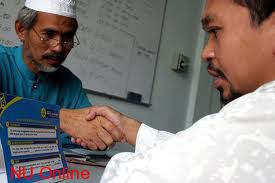Despite limits, mosques remain popular way to channel alms
NU Online · Selasa, 21 Agustus 2012 | 11:34 WIB
Jakarta, NU Online
Come Ramadhan, mosques in Indonesia bustle with people donating and collecting alms, or zakat, for the fasting month.<>
On the porch of one mosque in Condet, East Jakarta, a banner read: “Accepting zakat, infaq, and sedekah”. At another mosque in West Jakarta, three youngsters were seen setting up a post to receive alms. In Central Jakarta, after tarawih, or Ramadhan evening prayers, an official of another mosque reviewed his logbook on alms collection.
Islamic law obliges Muslims who are able to give two types of zakat. The first is zakat fitrah, or donations of food (or of cash earmarked for food), given at the end of Ramadhan. In Indonesia, recipients of zakat fitrah typically take home about 3.5 liters of rice. The second type of alms, zakat maal, comprises at least 2.5 percent of a person’s earnings and assets. Infaq and sedekah, meanwhile, are voluntary donations.
Despite the rise of zakat agencies and foundations in Indonesia, mosques remain prominent in collecting and channeling alms. However, mosques have been better at managing donations geared for consumption, according to leaders of zakat agencies and foundations.
At Baitul Huda Mosque in Kebon Kacang, Central Jakarta, Karto Suwiryo, known better as Ato, stands among sacks of rice piled three or four high. The zakat fitrah distribution organizer ordered a ton of rice to be disbursed to the poor during Idul Fitri.
A local trader sent the sacks of rice the night before, Ato, 48, said. The mosque will pay for the rice after it receives the last zakat fitrah payment on the eve of Idul Fitri.
Ato said that the mosque intended to deliver alms to 800 people this year, about Rp 27,000 (about US$ 2.85) per person. At Masjid At-Taqwa, in Pal-merah, West Jakarta, the organizers rounded the zakat fitrah payment up to Rp 30,000 per person.
Besides receiving zakat fitrah payments from donors each year, the mosque, located in the streets behind the Grand Indonesia, Plaza Indonesia and EX shopping malls, has also attracted donations from its well-healed neighbors.
Ato said that one of the malls donated Rp 100 million to renovate the mosque. Baitul Huda mosque treasurer Rubby Mudraf added that anonymous donors often sent building materials, such as a truckload of sand or cement, when the mosque was renovated last year.
There are nearly 9,000 mosques in Jakarta, according to the Religious Affairs Ministry. With Muslims comprising 88 percent of the nation’s population of almost 240 million people, Indonesia has almost 240,000 mosques.
Ato said that neighborhood leaders would start listing poor people eligible for zakat fitrah donations a week before Idul Fitri. Included in the list would be children with single parents. He said in his area, which was full of boarding houses for people working around Jl. MH Thamrin, there were less than 100 poor families.
Mosque volunteers from Baitul Huda would then deliver the donations to their homes, he said.
“We make it our policy to not let anyone line up for donations,” Ato said as quoted by The Jakarta Post. Helmi Ryansyah, 17, a volunteer at At Taqwa mosque also said that local teens would deliver the alms to the doorsteps of the poor.
Mosques have learned from past experiences, especially from the deadly stampede during Ramadhan in Pasuruan, East Java in 2008, in which 21 people were killed while lining up for cash handouts.
According to Forum Zakat (FOZ) head Sri Adi Bramasetia, zakat fitrah provides donation for consumption, targeting people who are extremely poor.
“The poor who are so poor that they could not be reached through economic empowerment programs … like it or not, [the alms] have to be for consumption,” he said.
National Alms Agency (BAZNAS) executive director Teten Kustiawan said that funneling zakat fitrah through mosques was appropriate, as local mosques had more direct knowledge of the people who were in need.
However, due to the nature of the donations and the limited resources, alms collected by mosques had little chance in lifting people out of poverty, according to alms foundation Dompet Dhuafa executive director Ahmad Juwaini
Editor : Sudarto Murtaufiq
Terpopuler
1
Khutbah Jumat: Ramadhan dan Kesempatan yang Tidak Selalu Terulang
2
Innalillah, Ulama Mazhab Syafii asal Suriah Syekh Hasan Hitou Wafat dalam Usia 83 Tahun
3
Khutbah Jumat: Ramadhan, Melatih Sabar, Memperkuat Syukur
4
Kultum Ramadhan: Lebih Baik Sedikit tapi Istiqamah
5
Keluar Mani yang Tidak dan Membatalkan Puasa
6
Khutbah Jumat: Tiga Kebahagiaan Orang Puasa
Terkini
Lihat Semua
















